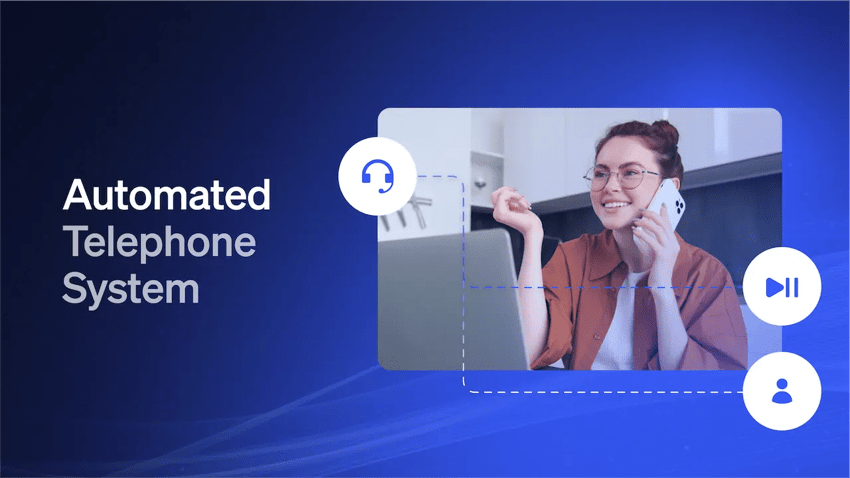Ask any athlete how they got better and reached the next level in their careers. They’ll say their secret is practice — and really great coaching.
The same is true for making performance improvements in your contact center. You can’t expect agents to turn up one day and be better at a certain skill.
Here, we’ll cover why you should include call center coaching in your call center strategy, 10 best practices to follow when coaching call center agents, and everything you need to build your own coaching program.
Why Is Call Center Coaching Needed?
The rationale behind call center coaching is twofold: It benefits your agents and your business. This mutual success contributes to the betterment of your customer-facing business functions and the processes within your business.
Benefits for your agents
When agents benefit from call center coaching, you can expect:
- Improved skills and performance: Coaching helps agents refine their communication, problem-solving, and technical skills, leading to better call handling and resolution.
- Higher confidence and motivation: Positive feedback (as well as the removal of negative feedback) and targeted guidance boost agent confidence, while goal setting and progress tracking increase motivation.
- Less stress and burnout: Effective coaching equips agents to handle challenging situations, mitigating stress and preventing burnout.
- Personal and career development: Coaching promotes continuous learning and skill development, opening up opportunities for career advancement.
When applied correctly, effective call center coaching is a powerful step toward supporting agents’ personal and business lives. This can only be good for your business.
Benefits for your business
When your business benefits from call center coaching, you can expect:
- Better customer experience: Improved agent skills translate to smoother customer interactions, happier customers, and higher satisfaction scores.
- Reduced call handling time: Efficiently resolving issues leads to shorter call durations, increased agent productivity, lower average handle time, and higher first-call resolution.
- Improved employee engagement and higher retention: Investing in agent development creates a positive work environment, boosting morale and reducing turnover.
As humans, we feed off each other’s energy. If your contact center agents are happy and well-trained in their roles, your customers are going to reap the rewards of your agents’ motivation and competence.
We can all recall examples of customers who called in and were greeted by a miserable agent who had gotten something wrong on their last call. Whether the customer was enquiring about pricing, reporting a fault, or checking on a previous issue, their mood switched to mirror the agent’s. This set the tone for the call, and everything went downhill.
Happy agents contribute to creating more cheerful customers who are patient and feel the agents are there to help.
10 Call Center Coaching Best Practices
The following coaching best practices apply throughout your business unit and are best applied continuously.
1. Create a useful knowledge base
You can’t expect your agents to know everything about every product, but you can create a comprehensive knowledge base for quick reference. This might be an FAQ database stored on your intranet or a help center available to both agents and customers.
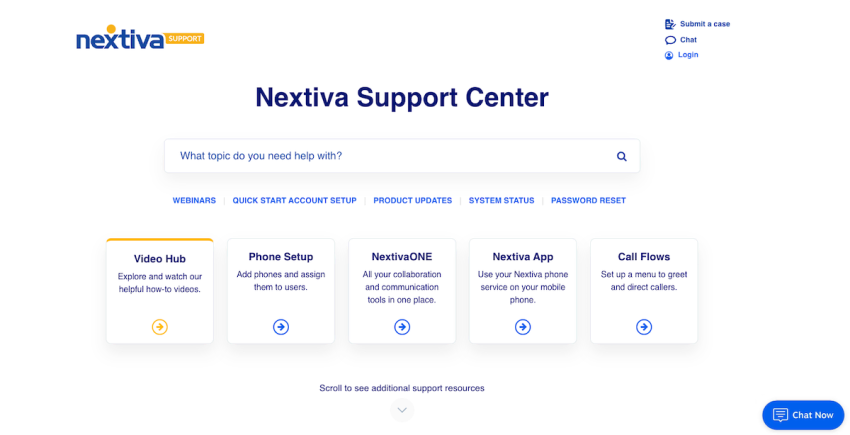
Outside of company-wide initiatives, tap into the skills of your most experienced agents. Encourage knowledge sharing and bite-sized learning for continuous skill enhancement. This might mean a one-off coaching session led by a seasoned agent or ask-the-expert sessions on a monthly or quarterly basis.
2. Help new agents master the craft
The more prepared agents are for real-life scenarios, the better they can handle them when they occur.
Use role-play based on real customer calls for practical training during agent onboarding. Make sure you introduce your agents to yes or no questions and lengthy, drawn-out troubleshooting scenarios with challenging customers.
Another call center agent coaching technique to implement before an agent takes their first call is to have them buddy up with mentors or top performers for one-on-one coaching.
Pair your new agent with a pro so they can shadow them for a few sessions. Encourage active listening and questions during wrap-up so agents get the most out of these interactions.
3. Leverage call center technology to your advantage
AI-powered solutions are the latest and greatest in call center technology at the moment. But you don’t have to go overboard. With management functions like analytics and dashboards, you can understand trends in the blink of an eye and tailor training based on common bottlenecks and FAQ.
You can get instant access to how customers felt about calls using post-call survey tools. With one simple question, you can get customers to score your calls from 1–10.
For basic queries and routine tasks that don’t need human input, such as providing opening hours or checking account balances, introduce call center automation such as interactive voice response or conversational AI.
Specific to the improvement of agent interactions, newer technologies (that are already gaining momentum and adoption) include AI Agent Assist.
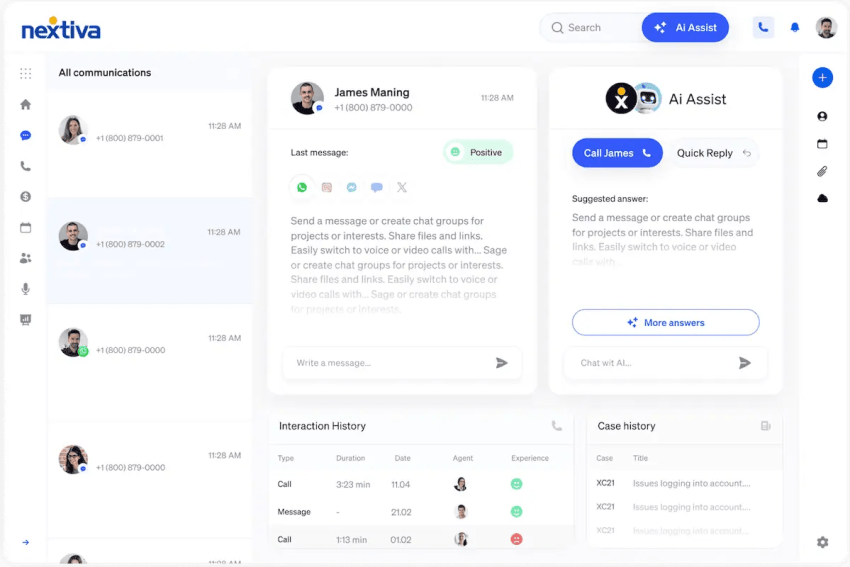
When an agent is struggling to remedy a call or when keywords or phrases get triggered, agents get an automatic pop-up on their display. Here, they get useful information, coaching, and guidance to accelerate first call resolution.
It can help with tasks like:
- Retrieving customer data
- Suggesting responses
- Pushing new products to cross-sell and upsell
- Flagging important information
- Automating repetitive tasks
While we’re still in the early stages of mainstream contact center AI, this virtual buddy has proven incredibly useful to junior and senior agents alike.
4. Use integrations for efficiency
Integration features like click to call and screen pop add a much-needed efficiency boost to physical agent tasks such as dialing and finding account information.
You can eliminate misdials and automatically load customer records when integrating your phone system with a customer relationship management (CRM) system.
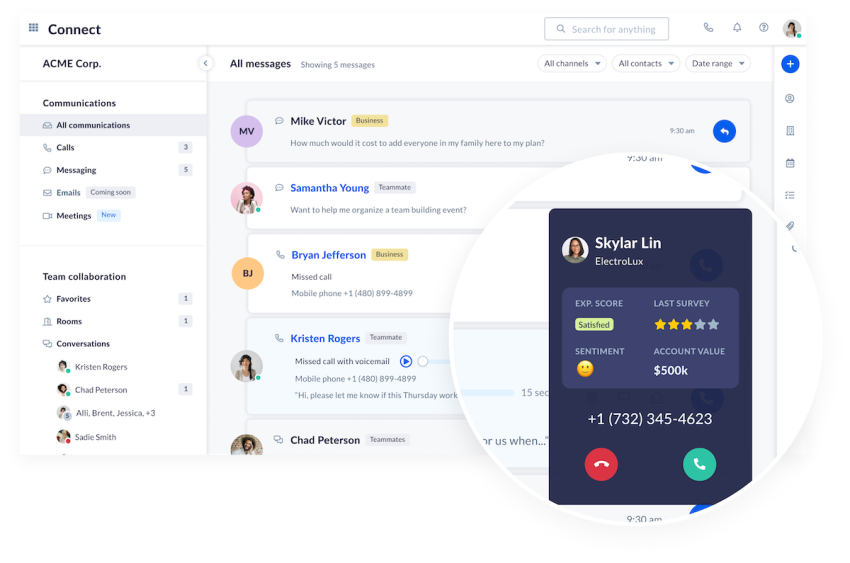
5. Prioritize customer-centricity
It’s hard to always put the customer first, especially if you’ve got other things on your mind. While we’re all human, it pays to make customers your priority.
However, that doesn’t mean you must ask agents to become robots. Instead, it means setting and tracking customer satisfaction scores and training agents in empathy and active listening.
When you know how customers feel about your customer service and you can see agents respond to encouragement and training, you can double down on what works. It’s a cycle that feeds itself.
Empower your agents to resolve issues promptly, even if they need to go off script. Don’t make it the company culture that every word on a page needs to be read verbatim. Let agents judge the situation and make their own decisions about whether the customer scenario demands it.
6. Craft a winning culture
If your call center team is genuinely a team, it’s only going to become better and better with time. Recognizing group achievements and hitting shared goals makes everyone feel supported. Create opportunities to celebrate your milestones together as a team.

Ensure that your team members have open lines of communication with each other and call center managers and supervisors. If someone has an idea based on customer feedback, make sure there’s a way to ensure that the suggestion is considered and a method for follow-up.
An environment where there are no bad ideas encourages people to speak up instead of hiding new winning strategies out of fear of negative consequences.
7. Celebrate your agents
As well as rewarding team efforts, it’s also important to acknowledge individual contributions. When it’s clear that an agent is making steps toward professional growth, congratulate them in person, online, or as part of your monthly all-hands meetings.
Be aware of how different people respond to group celebrations. Some agents may be more introverted, so an e-gift certificate may be better received than a presentation in front of your entire organization.
Using apps like Bonusly helps build a culture of appreciation by enabling supervisors and peers to send rewards based on an allocated balance:

8. Build resilience and well-being
News flash: Winning isn’t everything. You must also focus on employee well-being.
It can be tough listening to customer complaints all day, so providing stress management resources and flexible work options goes a long way. It might be as simple as allowing remote or hybrid work. Given that cloud call center software makes this possible, the only change to the work is the physical location.
Agents can benefit from the removal of commutes, the ability to take their dog for a walk on their break, or the chance to make a healthy lunch for a change.
Even when in the office, regular breaks and scheduled off-call activities help maintain a healthy, engaged team. You don’t have to reinvent the wheel.
Set aside time for agents to:
- Optimize workflows
- Help out with call center training
- Contribute to community or charity projects
9. Measure and iterate
Call center best practice dictates that what gets measured gets managed. If you’re not monitoring key performance indicators (KPIs) and conducting regular reviews of agent performance, you’re working in the dark.
When you move to being led by call center KPIs, you embrace a culture of continuous improvement. Instead of finger-in-the-air training based on hearsay and gut feelings, you can review and tailor coaching sessions to focus on the right areas.

10. Learn from every interaction
Working in a call center means you have a unique experience every time the phone rings. Every piece of data can be turned into information that helps your agents and your business.
Start by analyzing calls for coaching opportunities. Your quality assurance or quality management processes should lean into discovering opportunities that identify bad calls and encourage better outcomes next time, and identify great calls that can be used to showcase the right way to serve customers.
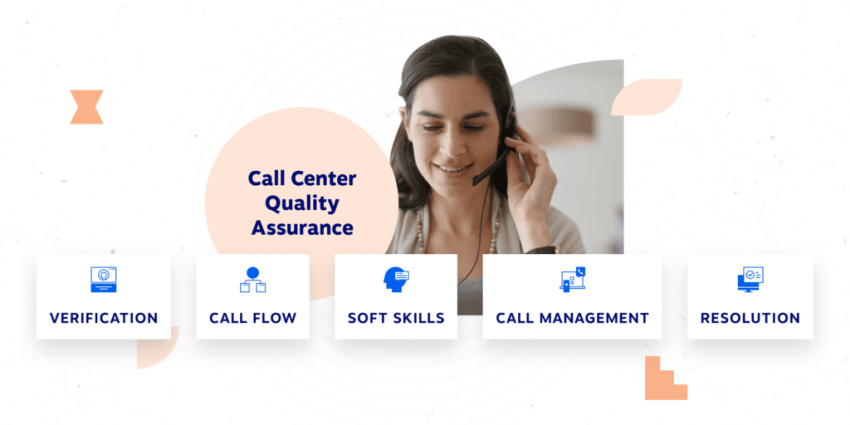
You can also gain valuable insights by asking agents how they think calls went. Listening back to call recordings (or listening in in real time) is one thing, but sometimes those recordings lack the rationale or emotional explanation that only agents can provide.
Call Center Coaching Strategies for Underperformers
If you have serial underperformers, you may need to take more drastic action. Use the table below to create your action plan to bring low-performing agents up to the standards your business demands.
| Coaching Focus | Specific Technique | Implementation | Expected Outcome |
|---|---|---|---|
| Skill gap analysis | Conduct data-driven performance gap analysis. | Review performance metrics, handle times, CSAT scores, and first-call resolution rates. Use side-by-side sessions to observe work habits. | Clear understanding of the root causes of underperformance. |
| Intensive one-on-one sessions | Schedule regular review and constructive feedback sessions. | Use the “feedback sandwich” approach. Start with a positive, address improvement areas, and end with a positive. Focus on specific behaviors, not personality. | Increased confidence and motivation through structured support. |
| Role-playing and simulation | Practice handling difficult customer scenarios. | Start with a demonstration from a coach, then switch roles. Use real call recordings as coaching tools. | Improved call handling skills and reduced anxiety. |
| SMART goal setting | Establish specific, measurable, achievable, relevant, and time-bound goals. | Set clear targets like “achieve a 90% customer satisfaction score within three months.” | Clear direction and measurable progress tracking. |
| Buddy system/mentoring | Pair underperformers with top performers. | Have struggling agents shadow experienced ones for several sessions with active listening and Q&A during wrap-up. | Accelerated learning through peer-to-peer knowledge transfer. |
| Real-time coaching | Provide live guidance during interactions. | Monitor live calls and provide discreet advice (whisper coaching) to correct issues immediately. | Immediate skill development and prevention of poor experiences. |
Remember to Coach Yourself
Your coaching processes will only improve if you work on yourself, too. To empower agents, you must also empower coaches.
There’s a lot to be said for top-down coaching. Sure, it positions you as the coach and the person entrusted with bettering your call center, but coaches are only as good as their mentors and trainers.
Abide by these three coaching principles to ensure your coaching style is that of a leader rather than an enforcer.
Leading starts with self-leadership
To some, leadership is a natural trait. If you led your school soccer team or were cheer captain, you understand being responsible for group success. For others, it’s a skill that they need to learn.
People can be high achievers when it comes to individual contributions. But that doesn’t always translate to effective management or coaching. By investing in your own growth and development, you become a better leader for your team.
Consider taking external courses on leadership, and add the following books to your reading list:
- Managing and Motivating Contact Center Employees
- Contact Center Management on Fast Forward
- The Making of a Manager
- The First 90 Days
Coaching is a journey
You won’t be perfect immediately. You can’t expect instant change.
But when you’re patient with yourself and celebrate small wins, you can make incremental changes that make you a better coach and help your agents progress, too.
By sharing your new skills with fellow staff members, your knowledge becomes vital to the success of the business. As one agent becomes a master in their field, you both level up, freeing you to continue learning and progressing in your own career.
Modeling what you preach
When people look to you for help and leadership, your actions and commitment to personal growth set the tone for your team.
If your agents see you’re giving your all, working smart, and encouraging others while looking after your physical and mental health, they’ll follow your lead.
Think about the way you wish to be perceived and the message you want to convey to those you’re responsible for. Always remember that what you show is what people will see.
Nextiva: Empowering Your Team With Call Center Software
Contact center coaching isn’t a one-and-done thing. It’s a learning journey for you and your agents. Incorporating regular coaching and auditing existing processes is extremely important to the success of your call center and wider business.
Introducing call center software that gives your agents all the tools they need to be successful at their jobs can make their lives easier and improve efficiency in your business. After all, it’s no good having the best call center agent on the planet if their tools stop them from showcasing their talent.
Nextiva’s call center platform gives your agents the tools they need to be successful.
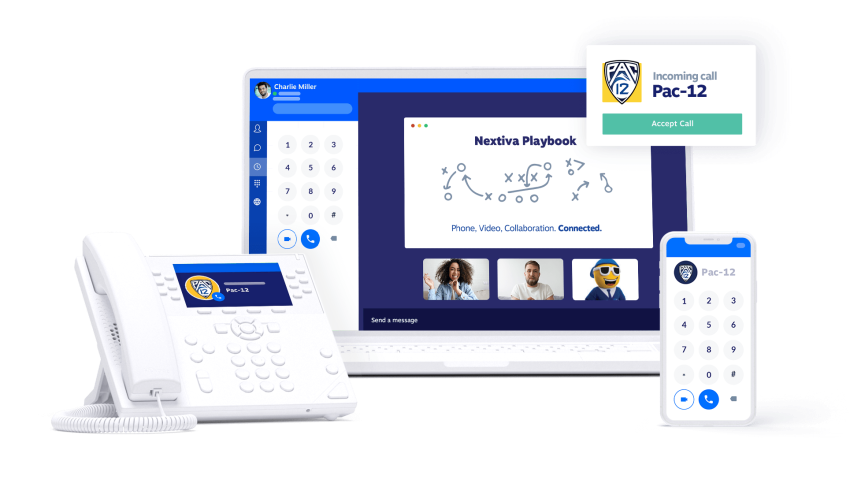
From features such as CRM integration for increased agent efficiency to call flows that allow the best-suited agent to handle a client’s call, Nextiva has your agents’ needs covered.
Likewise, coaches are looked after. Recording and monitoring come as standard features that can be fed into your speech analytics so all your data is interpreted and presented in easy-to-digest formats.
When combining high-quality coaching and the power of cloud call center software, everyone wins — especially your customers.
Your Call Center Solution
Built for any business at any stage. Including yours. See why sales and customer support teams use Nextiva to deliver a better customer experience.


















 Business Communication
Business Communication 











